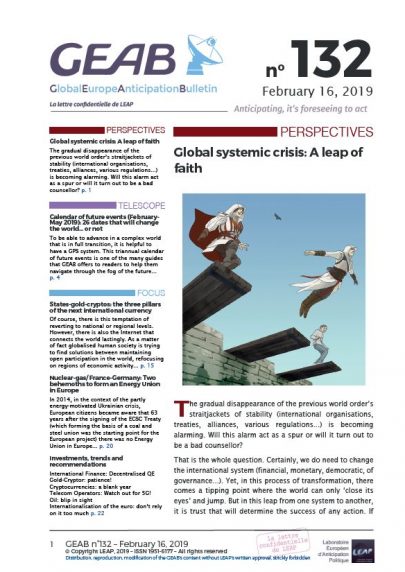GEAB 132
Have you noticed that all the efforts to regulate debt, derivatives, banks etc., made following the subprime crisis and meeting with varying degrees of success over the last ten years, are currently systematically undermined, including by the most serious players in the financial system? Here are some examples:
On the public debt side, the United States has just crossed the $22 trillion line, only one year after crossing the $21 trillion line,[1] clearly abandoning any attempt at reduction.
The yellow jacket crisis forced Emmanuel Macron to sign a cheque for 11 billion euros in support of purchasing power, not to mention the expenses incurred by the demonstrations and various damages, raising the French deficit from the 2.8% of GDP originally forecast for 2019 to 3.2% or 3.4% – that is 0.2 to 0.4 points above the European legal limit.[2]
Of course, there is also Italy, the third largest economy in the eurozone and one of the most indebted countries in the world (fourth position, 132% of GDP), whose ‘populist’ government, whilst having a country to run, does not intend to abide by the austerity injunctions imposed by higher authorities (Europe, Germany, IMF…), preferring to consider selling its gold reserves or to question the sacrosanct independence of its central bank.[3]
And then there is Japan with 10 trillion debt of its own, or $79,000 per capita, a country which will issue another $296 billion of government bonds at the end of its fiscal year at end of March.[4]
The United States, Europe, Japan: who can afford to give lessons to whom about sound financial management?
Login

The gradual disappearance of the previous world order’s straitjackets of stability (international organisations, treaties, alliances, various regulations...) is becoming alarming. Will this alarm act as a spur or will it [...]
To be able to advance in a complex world that is in full transition, it is helpful to have a GPS system. This triannual calendar of future events is one [...]
Of course, there is this temptation of reverting to national or regional levels. However, there is also the Internet that connects the world lastingly. As a matter of fact globalized [...]
In 2014, in the context of the partly energy-motivated Ukrainian crisis, European citizens became aware that 63 years after the signing of the ECSC Treaty (which, forming the basis of [...]
A reminder that our recommendations are not for speculative purposes, therefore short-term, that they don’t aim to win more, but rather to lose less (even nothing) because in the case [...]

Comments